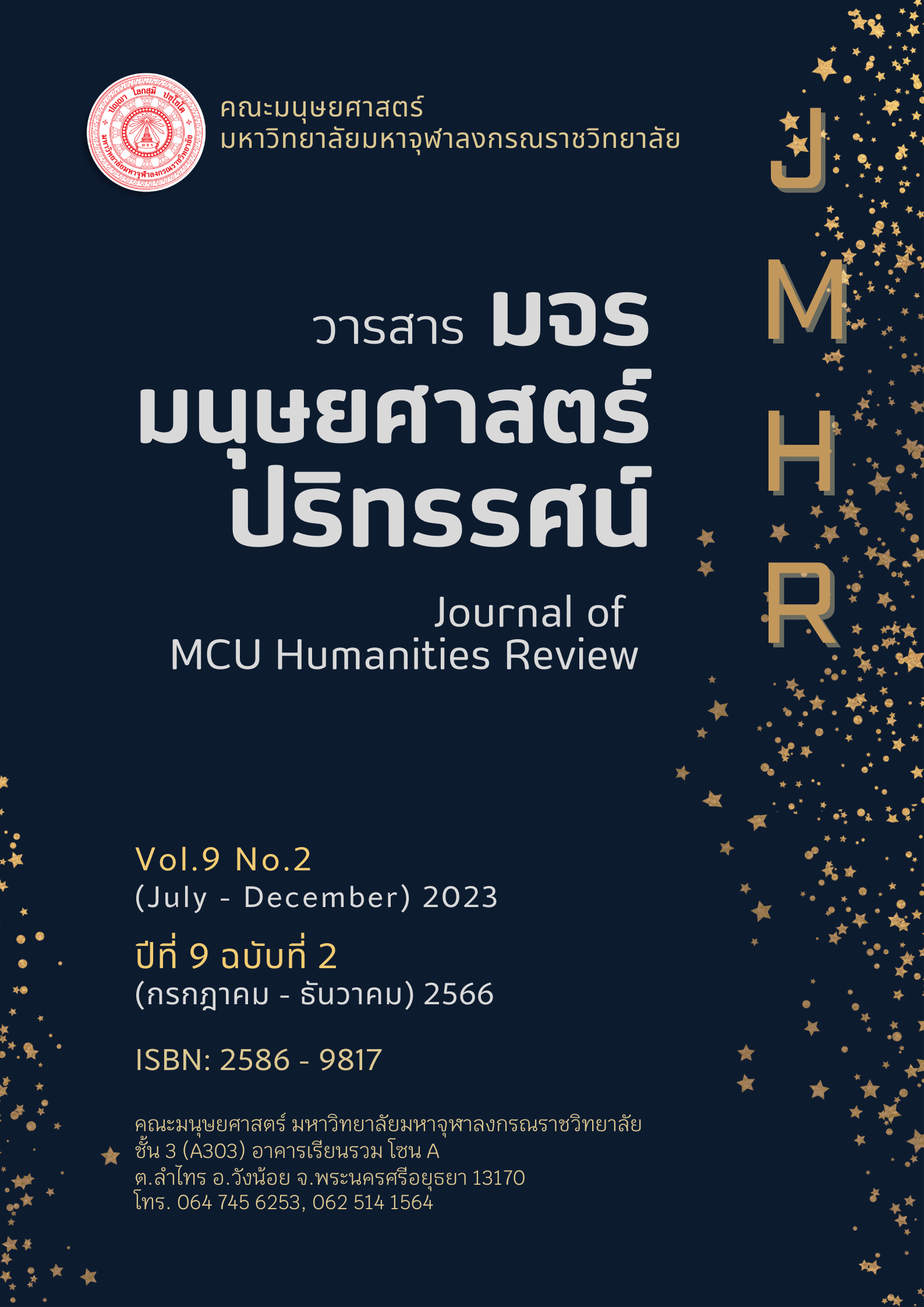สุขภาวะองค์รวมตามแนวพุทธจิตวิทยาของนักเรียนชั้นมัธยมศึกษาตอนต้น
คำสำคัญ:
สุขภาวะองค์รวม, พุทธจิตวิทยา, นักเรียนชั้นมัธยมศึกษาตอนต้นบทคัดย่อ
การวิจัยนี้เป็นการวิจัยเชิงสำรวจมีวัตถุประสงค์ 1. เพื่อศึกษาระดับสุขภาวะองค์รวมตามแนวพุทธจิตวิทยาของนักเรียนชั้นมัธยมศึกษาตอนต้น 2. เพื่อศึกษาเปรียบเทียบปัจจัยส่วนบุคคลของนักเรียนชั้นมัธยมศึกษาตอนต้นส่งผลต่อสุขภาวะองค์รวมตามแนวพุทธจิตวิทยา และ 3. เพื่อศึกษาความสัมพันธ์ระหว่างปัจจัยส่วนบุคคลของนักเรียนชั้นมัธยมศึกษาตอนต้นและสุขภาวะองค์รวมตามแนวพุทธจิตวิทยา กลุ่มตัวอย่างในการวิจัย คือ นักเรียนชั้นมัธยมศึกษาตอนต้นโรงเรียนปลวกแดงพิทยาคม จังหวัดระยอง ปีการศึกษา 2565 จำนวน 318 คน ผู้วิจัยใช้แบบสอบถามเป็นเครื่องมือในการวิจัย สถิติที่ใช้ในการวิเคราะห์ข้อมูล คือ ค่าร้อยละ ค่าเฉลี่ย ส่วนเบี่ยงเบนมาตรฐาน และเปรียบเทียบความแตกต่างด้วยโดยการทดสอบ t-test, F-test และจำแนกเป็นรายคู่โดยวิธี Least Significant Different (LSD) ส่วนทดสอบความสัมพันธ์ใช้การทดสอบไคสแควร์ (Chi-Square)
ผลการวิจัยพบว่า
สุขภาวะองค์รวมตามแนวพุทธจิตวิทยาของนักเรียนชั้นมัธยมศึกษาตอนต้น โดยภาพรวมค่าเฉลี่ยอยู่ในระดับมาก = 3.58, (S.D. = 0.56) เมื่อจำแนกเป็นด้าน พบว่า ด้านสุขภาวะทางสังคมอยู่ในระดับมาก รองลงมา ได้แก่ ด้านสุขภาวะทางจิตใจ (จิตภาวนา) และด้านสุขภาวะทางปัญญา (ปัญญาภาวนา) และด้านสุขภาวะทางกาย (กายภาวนา) มีค่าคะแนนเฉลี่ยเป็นอันดับสุดท้าย ตามลำดับ ผลการวิเคราะห์เปรียบเทียบระดับสุขภาวะองค์รวมแนวพุทธจิตวิทยา พบว่า จำแนกตาม เพศ อายุ สถานภาพครอบครัว อาชีพผู้ปกครองและลักษณะสุขภาพต่างกัน ค่าเฉลี่ยสุขภาวะองค์รวมแนวพุทธจิตวิทยาของนักเรียนชั้นมัธยมศึกษาตอนต้น ไม่แตกต่างกันอย่างมีนัยสำคัญทางสถิติ ส่วนความสัมพันธ์ระหว่างปัจจัยส่วนบุคคลและสุขภาวะองค์รวมตามหลักพุทธจิตวิทยาของนักเรียนชั้นมัธยมศึกษาตอนต้น พบว่า ปัจจัยส่วนบุคคลจำแนกตามลักษณะสุขภาพมีความสัมพันธ์กับสุขภาวะองค์รวมตามหลักพุทธจิตวิทยาอย่างมีนัยสำคัญทางสถิติที่ระดับ .05 ส่วน เพศ อายุ สถานภาพครอบครัว อาชีพผู้ปกครอง พบว่า ไม่มีความสัมพันธ์กับสุขภาวะองค์รวมตามหลักพุทธจิตวิทยาอย่างมีนัยสำคัญทางสถิติ
เอกสารอ้างอิง
กมลาศ ภูวชนาธิพงศ์ และคณะ. (2564). โครงการนวัตกรรมสุขภาวะวิถีพุทธและพุทธจิตบำบัดเพื่อลดปัจจัยเสี่ยงภาวะซึมเศร้าของเยาวชนไทย. วารสาร มจร อุบลปริทรรศน์, 6(2), 531-542.
ธาราพรศ์ ศรีบุญญรักษ์. (2564). ความสัมพันธ์ระหว่างความรู้กับพฤติกรรมการดูแลสุขภาพตนเองตามสุขบัญญัติแห่งชาติ ของนักเรียนโรงเรียนในสังกัดสำนักงานเขตพื้นที่การศึกษามัธยมศึกษา เขต 10 อำเภอเมืองสมุทรสาคร จังหวัดสมุทรสาคร, สิกขาวารสารศึกษาศาสตร์, 8(1), 67-75.
ประยูร สุยะใจ. (2565). การพัฒนาและทดลองรูปแบบการเสริมสร้างสุขภาวะองค์รวมของ ครอบครัวและสถาบันทางสังคมตามแนวพุทธจิตวิทยาบูรณาการ: ภาควิชาจิตวิทยา คณะมนุษยศาสตร์ มหาวิทยาลัยมหาจุฬาลงกรณราชวิทยาลัย, วารสารมหาจุฬาวิชาการ, 9(3), 42-58.
ประเวศ วะสี. (2547). ทฤษฎีใหม่ทางการแพทย์. กรุงเทพฯ: สำนักพิมพ์หมอชาวบ้าน.
ฃปริญญา จิตอร่าม. (2561). สุขภาวะกับการเรียนรู้ตลอดชีวิต. วารสารสาธารณสุขและวิทยาศาสตร์สุขภาพ, 1(2), 65-68.
พรทิพย์ เกศตระกูล และคณะ. (2565). พุทธจิตวิทยาเพื่อพลังใจวัยรุ่น. วารสารพุทธจิตวิทยา, 7(2), 80-88.
พระจักรี ปิยวณฺโณ (ชูม่วง). (2560). ปัจจัยที่สัมพันธ์กับสุขภาวะองค์รวมของนักเรียนชั้นมัธยมศึกษาตอนปลายของโรงเรียนในเขต ยานนาวา-สาทร กรุงเทพมหานคร. วารสาร มจร สังคมศาสตร์ปริทรรศน์, 6(2) (ฉบับพิเศษ เล่มที่ 2), 413-426.
พิณนภา แสงสาคร. (2555). การสังเคราะห์ องค์ความรู้เกี่ยวกับสุขภาวะทางจิตวิญญาณในบริบทของสังคมไทย, วารสารพฤติกรรมศาสตร์, 18(1), 85-94.
ริษา ดีจุฑามณี และคณะ. (2565). พฤติกรรมการบริโภคอาหารเช้าของนักเรียนชั้นมัธยมศึกษาในจังหวัดกรุงเทพมหานคร. Thai Journal of Public Health, 52(1), 30-43.
วีรวิชญ์ เลิศรัตน์ธำรงกุล. (2564). การกลั่นแกล้งกันในพื้นที่ไซเบอร์ของนักเรียนระดับมัธยมศึกษาตอนต้น: ความชุก วิธีการจัดการปัญหาและพฤติกรรมเสี่ยง, วารสารวิชาการและวิจัย มหาวิทยาลัยภาคตะวันออกเฉียงเหนือ, 11(1), 275-289.
สุมาลี วาณิชวโรตม์. (2541). ประชากรกับการพัฒนาสุขภาวะองค์รวม (Population and Quality of Life Development) (พิมพ์ครั้งที่ 4). นนทบุรี: พิมพ์ลายมือ.
สำนักงานพัฒนานโยบายสุขภาพระหว่างประเทศ. (2564). รายงานการศึกษาสาเหตุการตายของประชากรไทย พ.ศ. 2560-2562. นนทบุรี : สำนักงานพัฒนานโยบายสุขภาพระหว่างประเทศ.
Diener, E., Suh, E. M., Lucas, R. E., & Smith, H. L. (1999). Subjective well-being: Three decades of progress. Psychological Bulletin, 125(2), 276-302.
Hurlock, E. B. (1968). Developmental psychology. (New York: McGraw-Hill.
Pender, N. .J. (1987). Health promotion in nursing practice (Second Edition). Connecticut: Appleton & Lange.
ดาวน์โหลด
เผยแพร่แล้ว
รูปแบบการอ้างอิง
ฉบับ
ประเภทบทความ
หมวดหมู่
สัญญาอนุญาต
ลิขสิทธิ์ (c) 2023 วารสาร มจร มนุษยศาสตร์ปริทรรศน์

อนุญาตภายใต้เงื่อนไข Creative Commons Attribution-NonCommercial-NoDerivatives 4.0 International License.






